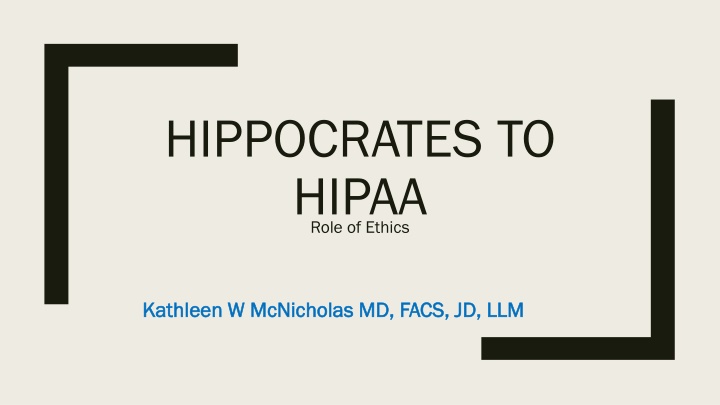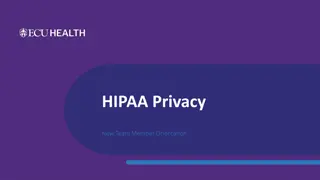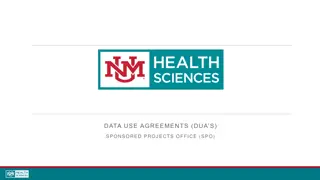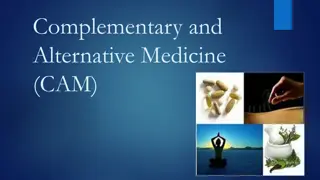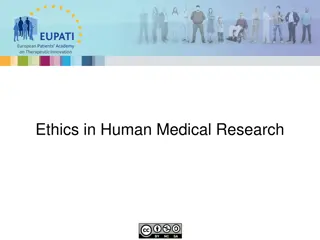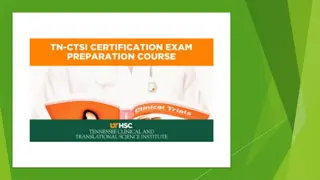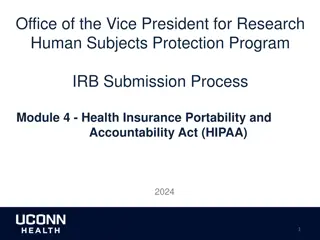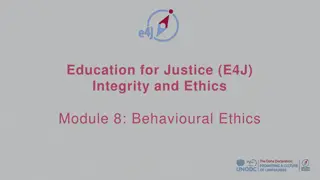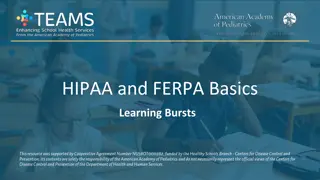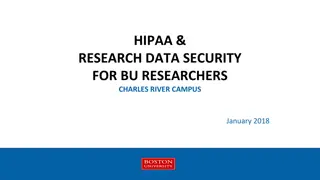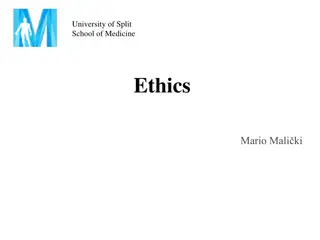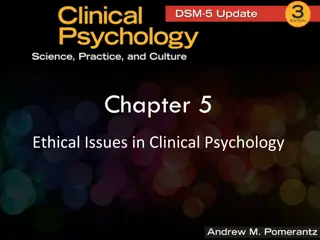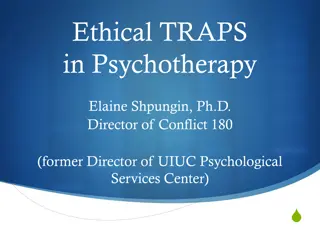Ethical Principles in Medicine: From Hippocrates to HIPAA
Explore the evolution of ethics in medicine from the ancient Hippocratic Oath to modern-day codes of ethics. Learn about the core principles of autonomy, beneficence, non-maleficence, and justice that guide healthcare professionals. Discover the role of ethics in upholding patient rights, confidentiality, and professionalism, as demonstrated in the transition from historical oaths to current ethical standards like those set by the HIPAA regulations.
Download Presentation

Please find below an Image/Link to download the presentation.
The content on the website is provided AS IS for your information and personal use only. It may not be sold, licensed, or shared on other websites without obtaining consent from the author.If you encounter any issues during the download, it is possible that the publisher has removed the file from their server.
You are allowed to download the files provided on this website for personal or commercial use, subject to the condition that they are used lawfully. All files are the property of their respective owners.
The content on the website is provided AS IS for your information and personal use only. It may not be sold, licensed, or shared on other websites without obtaining consent from the author.
E N D
Presentation Transcript
HIPPOCRATES TO HIPAA Role of Ethics Kathleen W McNicholas MD, FACS, JD, LLM Kathleen W McNicholas MD, FACS, JD, LLM
Ethics Ethics
Hippocratic oath Hippocratic oath One of the oldest binding documents in history Oath written by Hippocrates over 2500 years ago Held sacred by physicians To treat the ill to the best of one s ability, to preserve a patient s privacy, to teach the secrets of medicine to the next generation
Classic Version of the Hippocratic Oath Classic Version of the Hippocratic Oath I swear by Apollo Physician and Asclepius and Hygeia and Panaceia and all the gods and goddesses, making them my witnesses, that I will fulfil according to my ability and judgement this oath and this covenant What I may see or hear in the course of the treatment or even outside of the treatment in regard to the life of men, which on no account one must spread abroad, I will keep to myself, holding such things shameful to be spoken about. If I fulfill this oath and do not violate it, may it be granted to me to enjoy life and art, being honored with fame among all men for all time to come; if I transgress it and swear falsely, may the opposite of all this be my lot.
Modernized version of Hippocratic Oath Modernized version of Hippocratic Oath What I may see or hear in the course of the treatment or even outside of the treatment in regard to the life of men, which on no account one must spread abroad, I will keep to myself holding such things shameful to be spoken about. Dr. Louis Lasagna
Codes of Ethics Codes of Ethics Biomedical Healthcare Business Personal and Professional
Biomedical Ethics Autonomy Autonomy Patient s Right to make own choice Beneficence Beneficence Acting with best interest of patient in mind Nonmalificence Nonmalificence Do No Harm Justice Justice Treat others fairly and equally, Distributive Justice
Seven Principles of Health Care Ethics Seven Principles of Health Care Ethics Patient has right to make their own decisions Autonomy Care should benefit the patient Beneficence Nonmalificence Justice Confidentiality Do no harm What is fair to all patients and society Protection of personal information Truth telling Veracity Role Fidelity Follow job description; work within credentials
AMA Code of Ethics AMA Code of Ethics Respect for autonomy and for patients Beneficence and Fiduciary responsibility Trust Fidelity Ethical considerations supporting privacy and confidentiality.
Respect for Autonomy Respect for Autonomy Right to decide sharing of personal information Different consideration for expressly consented, authorized, and endorsed disclosures
Beneficence and Fiduciary Responsibility Beneficence and Fiduciary Responsibility Commitments to protect and promote patients health-related and other interests Commitments to avoid causing loss or harm to one s patients Types of harm Economic Economic such as employment discrimination or identity theft Social harm Social harm, such as stigmatization or damage to family relationships (HIV disclosure or genetic information) Legal harm Legal harm, such as prosecution for drug related offenses
Trust Trust Trust is the bedrock of the patient-physician relationship Privacy protections required in treatment Consistent, reliable privacy protection practices within and across professions and institutions in provision of health care and conduct of research
Fidelity Fidelity Implicit or explicit promises of confidentiality must be factored in when evaluating whether the ethical considerations supporting an exception to confidentiality are overriding . Generally recognized exceptions to the duty to maintain confidentiality including communicable disease to public health authorities and suspected child abuse to child protection agencies.
Confidentiality of Medical Information Confidentiality of Medical Information Health care relationship creates a special duty on the part of provider to protect a patient s interests Duty to protect the confidentiality of patient information
Legal Duty Regarding Patient Confidentiality Legal Duty Regarding Patient Confidentiality Source of the obligation? On whom is the duty imposed? What are limits of the duty? What remedies are available for breaches of confidentiality? Does system of legal protections effectively balance Patient Rights? Provider duties? Social interests?
Constitutional Right of Confidentiality Constitutional Right of Confidentiality Constitutional Right to privacy of medical information Balancing test to determine whether the government entity s interest in disclosure is substantial enough to outweigh the individual s privacy interest.
Common Law Duty to Maintain Confidentiality Common Law Duty to Maintain Confidentiality Most states private cause of action against a HCP who impermissibly discloses to third parties confidential information obtained in the course of treatment Depending on jurisdiction, the claim may be phrased as follows: breach of contract act of malpractice breach of fiduciary duty act of fraud/misrepresentation breach of specific civil statute permitting award of damages.
Statuary Protection of Confidentiality Statuary Protection of Confidentiality Statutes must be read to determine the following: Type of information protected from disclosure who has duty to maintain confidentiality Standard of care applied to determine a breach circumstances under which confidentiality may be breached circumstances under which the duty terminates relationship between state and federal law.
Confidentiality of Personal Health Information Confidentiality of Personal Health Information Deeply held value in clinical and professional ethics Indispensable pillar of provider-patient relationship Patients secure in sharing sensitive personal information
Relationship of Law and Ethics Some believe that law is too blunt an instrument to deal with the delicate, intimate, and highly variable situations that characterize bioethics Law may protect patients from medical dominance and overreaching Undesirable consequences of the legalization of an obligation or medicalization of a personal or social problem Legal standards setting a floor for acceptable behavior may be criticized for stimulating a drive to the bottom and a diminution of a commitment to ethical behavior Obligations defined by law do not encompass the complete moral obligations of the health care professional.
Convergence of Law and Ethics Explicit adoption of ethical norms and ethical modes of reasoning in regulation and case law Shared methodologies between law and ethics apparent in casuistry (case based, fact specific) The culture and norms of legal system contributes particular values in bioethics debates
Patient Confidentiality and HIPAA Patient Confidentiality and HIPAA HCPs subject to wide spectrum of laws and regulations governing the maintenance and disclosure of information. Comprehensive nation-wide policy regarding patient privacy established by HIPAA (1996). Series of Rules promulgated by DHSS including Privacy, security, and enforcement (2003) and Breach Notification Rule (2013) HIPAA applies unless a state law is more stringent
HIPAA HIPAA Improve Medicare Program Improve Medicaid Program Promote efficiency of the health care system by encouraging the development of an electronic health information system Encourage national standards and requirements for the electronic transmission of health information
December 2000 version of Privacy Rule December 2000 version of Privacy Rule Written Consent Personal Identifiable Health Information related to treatment, payment, or healthcare operations (TPO) Disclosure for other purposes More elaborate patient authorization
August 2002 Privacy Amendment August 2002 Privacy Amendment Eliminated requirement for patient consent for release of health information for TPO Updated Requirements: Notification of patients of entities privacy policies AND A good- faith effort to secure a written acknowledgment from the patient
Federalization of Health Information Privacy Federalization of Health Information Privacy Federal rules establish a floor that evens out the basic level of protection across states Federal rules impose specific obligations on specified health care entities rather than focusing solely on physicians and other HCPs Federal laws explicitly permit states to enact more protective rules as long as they do not conflict with federal laws.
HIPAA HIPAA Not all aspects of HIPAA are grounded in ethical practices Overall thrust consistent with the ethical practice of medicine and surgery General alignment of legal and ethical requirements Reasonableness and good judgement- Professionalism
HIPAA HIPAA Complex regulatory framework Violation may result in a significant civil penalty or criminal liability or both Regulations do not provide a private cause of action or remedy for patients
HIPAA Regulations Innumerable administrative hoops Questionable benefit to patients OR Support for professional judgement Quality of Medical Care
HIPAA HIPAA - - Case Case Nurse viewed patient s medical record out of personal curiosity Patient was notified that employee inappropriately accessed electronic record Question Question Did patient allow nurse to view record Did the nurse have the patient s best interest in mind? Violation Violation Nurse violated patients autonomy Not acting with beneficence No No Did the actions result in harm? No BUT Most would object to intrusion because not clear if information was used Medical identity theft is prevalent and profitable Other questions: Other questions: Did the nurse treat patient fairly (justly) Was there a breach?
HIPAA Case HIPAA Case An unencrypted laptop was stolen from an employee s desk in a drug and alcohol center. Information contained SS numbers, driver s license numbers, health insurance information, financial information, disability codes, and more. 52,076 patients affected Question Question Did the patients have decision- making autonomy? No-Decision to have unencrypted PHI on laptop was not theirs Did the patient benefit in any way Was their harm? No- Patient benefitted in any way Possibly- information was transferred to unknown hands with potential for harm. Other Question to consider: Was there a Breach?
Case study Case study J is a nurse working in the ED of a small community Hospital J s husband is a member of the local police force Patient is a frequent flier to ED with chronic pain PO suspects narcotics prescription fraud and requests access to EHR
Ethical decision making process Ethical decision making process Problem/ Issues Release of information Violation of privacy Cooperation with law enforcement
Information Information Would patient approve of release Nursing code of ethics Hospital Policy Question Consult with hospital privacy officer? Reference to Laws and Regulations
Ethical Principles Ethical Principles Release of information- strip patient of his autonomy Concern of obstructing investigation-Justice, society impact Beneficence- Will action benefit patient. Help patient recovery. If arrested may stop using drugs Community benefit to decrease drug abuse Potential Harm to patient and community and relationship of patient/ hospital /police . Principle of Nonmaleficence and do no harm
Legal Considerations Legal Considerations State law- maintain confidentiality in lieu of court order HIPAA- allows response to court-ordered warrant Professional Code of Ethics-put patient first and protect rights and safety while following the law
Options considered Options considered Ask patient permission and share. Risk hindering investigation. Give information as favor to police. Ask officer to obtain warrant.
Action Action Call to privacy officer Insist on warrant Uphold rights of patient Follow HIPAA regulations Follow policies and procedures Protect Autonomy of patient Beneficence- patient s best interests No Harm done (nonmaleficence) Fairness to patient and community- Justice
HIPAA Misunderstandings HIPAA Misunderstandings Obstacles to family support Barriers to Proper care and treatment in crisis situation Rigid/ Inflexible
Opioid Crisis Opioid Crisis October, 2017 President Trump s call to action in public health emergency Guidance on when and where HCPs can share PHI HHS brought all resources to bear to address the crisis We know that support from family members and friends is key to helping people struggling with opioid addiction, but their loved ones can t help if they aren t informed of the problem . Acting HHS Secretary Eric D. Hargan Our clarifying guidance will give medical professionals increased confidence in their ability to cooperate with friends and family members to help save lives. HHS Press office
Disclosure permitted Disclosure permitted May share information with patient s loved ones in certain emergency or dangerous situations. Informing persons in a position to prevent or lessen serious and imminent threat to a patient s health or safety It is critical for HCPs to understand how they can share information without violating the HIPAA Privacy Rule Caveat: It is important to note that state or other privacy laws may also apply. HIPAA does not interfere with state laws or medical ethic rules that are more protective of patient privacy.
May share SOME health information WITHOUT May share SOME health information WITHOUT patient s permission under certain circumstances patient s permission under certain circumstances Family or close friends Involved in care of patient Decision in best interest Incapacitated or unconscious patient Information directly related to family or friend s involvement in care or payment of care About overdose and related medical information BUT, generally could not share medical information unrelated to the overdose without permission.
May inform May inform Persons in a position to lessen a serious and imminent threat to a patient s health or safety.
To comply with HIPAA To comply with HIPAA Doctor informs family, friends, or caregivers of opioid abuse after determining: Based on facts and circumstances That patient poses a serious and imminent threat to his or her health through continued opioid abuse Upon discharge
HIPAA respects individual autonomy HIPAA respects individual autonomy Certain limitations on sharing health information with family members, friends, and others without patient s agreement Patient must have opportunity to agree or object to sharing information Provider is not permitted to share information about patients who currently have capacity to make own health care decisions and object to sharing the information (generally or to specific persons) UNLESS there is a serious and imminent threat of harm to health
HIPAA anticipates that a Patients decision making HIPAA anticipates that a Patient s decision making capacity may change in course of treatment capacity may change in course of treatment Decision- making capacity may be temporary and situational No need to rise to level of appointment by law of another decision maker HCPs decide if sharing information is in best interest How much and what type is appropriate to share While patient is incapacitated Information shared must be related to the person s involvement with patient s health care or payment for such care. If capacity returns and patient objects to future sharing, the provider may still share information to prevent or lessen serious and imminent threat to health or safety.
HIPAA recognizes patients personal HIPAA recognizes patient s personal representatives according to state law. representatives according to state law. Personal representatives have right to request and obtain any information about patient that the patient could obtain. Health care decision making authority under state law. Authority through parental relationship between parent or guardian of an un-emancipated minor, or through written directive, health care power of attorney, appointment of a guardian a determination of incompetency, or other recognition consistent with state laws to act on behalf of individual making health care related decisions.
How HIPAA Allows Doctors to Respond How HIPAA Allows Doctors to Respond to the Opioid Crisis to the Opioid Crisis Address misunderstandings Obstacles to family support Crucial to proper care and treatment Crisis situation Broad ability to share health information with patients family members with certain crisis situations without violating HIPAA privacy regulations Policy considerations Right thing to do The ETHICAL thing to do
Permitted Uses and disclosures of PHI Permitted Uses and disclosures of PHI The use and disclosure is required for treatment, payment or other health care operations (TPO) An emergency situation where a healthcare decision must be made by a person that the individual has previously given consent or a healthcare professional in charge who must use professional judgement The healthcare provider should limit the PHI disclosure to the minimum amount needed for the circumstances in order to continue to protect the patient s privacy as much as possible.
Permitted Uses and Disclosures Permitted Uses and Disclosures For treatment, payment, or health care operations, which in some cases requires A GOOD FAITH EFFORT to obtain the individual s written acknowledgement of receipt of the covered entity s notice of privacy practices. Assumption that appropriate consent or authorization was accurately obtained. Proforma- Done or produced as a matter of form. A standard document, form, or financial statement. As a matter of form. assumed
